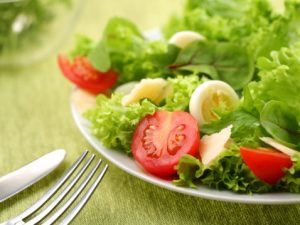 Salads can be chocked full of healthy food items and loaded with essential nutrients, however not all salads are created equally and if you buy into any of the following salad myths you may be unintentionally sabotaging your health and/or weight loss efforts.
Salads can be chocked full of healthy food items and loaded with essential nutrients, however not all salads are created equally and if you buy into any of the following salad myths you may be unintentionally sabotaging your health and/or weight loss efforts.
Myth #1: Salads are Low in Calories
Advertisement
Many people assume that ordering a salad from a restaurant or fast food establishment is a great choice if they are watching their weight, but for the most part this is a false assumption. Although the lettuce and any fruits and vegetables that may be in the salad are virtually calorie-free most restaurants and fast food chains load their salads up with high fat creamy dressings, and calorie dense toppings such as croutons, breaded chicken and bacon bits. In fact, a southwest salad with crispy chicken from McDonalds has 450 calories and 21 grams of fat, which is nearly twice as many calories and fat as a McDonalds hamburger and there are even some restaurant salads have upwards of 1000 calories and 70 grams of fat (more than your daily serving of fat) per plate!
#2: Salads are a Healthy Food Great for Weight Loss
You may be thinking this one is redundant since we just established that many salads are high in calories and fat, but what you may not know is that even low calorie and low fat salads aren’t necessarily congruent to weight loss. Consuming a salad as a side or an appetizer can help to fill you up and provide you with an array of healthy food items, however substituting salads for meals on an ongoing basis will leave you feeling deprived and the lack of protein will force your brain to send out desperate hunger signals that can result in uncontrollable eating.
#3: Fat Free Dressings Are Better for Health and Weight Loss
Despite popular belief all fats are not bad, and many types of fat are absolutely essential to your survival. A full fat salad dressing made with olive oil, flaxseed oil or avocado oil will provide your brain (which is made up of 66% fat) with the essential fats that it requires in order to thrive, and in so doing, your hunger levels will be reduced. Full fat salad dressings are also beneficial because they help your body to absorb the nutrients that are in the salad you are consuming. Consuming fat free salad dressings on the other hand, will result in no absorption of the cancer fighting, heart protective carotenoid antioxidants or the fat-soluble vitamins which are found in many of the fruits and vegetables commonly used in salads. Worse still, fat free dressings are usually loaded with sugar and highly processed, artificial flavorings.
#4: Salads are Inherently Healthy
Advertisement
If you make a salad at home with fresh ingredients and a homemade balsamic vinaigrette than salads are absolutely healthy. The problem is that most people use store bought dressings which are loaded with processed ingredients and preservatives, not to mention calories and heart disease causing hydrogenated fats. Worse still, they load their salads up with unhealthy ingredient such as processed cheese, bacon bits and croutons resulting in a plate that is loaded with artificial preservatives and devoid of protein and healthy fats.
#5: All Lettuce Varieties are Equally Healthy
Iceberg lettuce (the staple of many salads) is not unhealthy but it is not nearly as nutrient dense as the darker leafy greens such as romaine, spinach, kale, watercress and arugula. Dark leafy greens are packed with cancer fighting, health boosting nutrients such as lutein, beta carotene and vitamin C and should be used in place of iceberg when possible.
